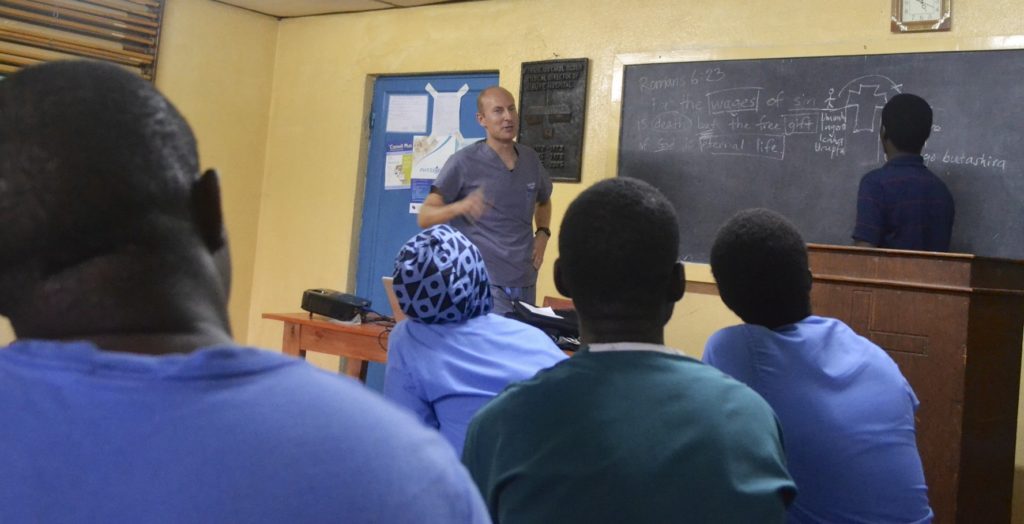
“I am going to award you 10 points out of 20.”
I could see their faces fall as the impact of my grading statement landed in their hearts. In the Belgian system we have borrowed and adapted at Hope Africa University, 12/20 is passing. They had clearly fallen short.
As I reviewed the breakdown of their scores with them, these three Burundian medical students became increasingly aware that their failure to pay attention to the details had cost them points on their presentation of “Hematuria” (blood in the urine). In all fairness, theirs had been a pretty average presentation: data dutifully copied from some paper or online sources, slides hastily constructed at the last minute because other things were more pressing until the day before they presented and relatively little interaction with the audience. But what really got me were the errors in spelling, grammar & formatting. Every slide was a minefield of minor inattentions that conspired to distract from what they were saying. They lost 3 points on that basis alone.
If you ask my teammates, I’m the most likely to fail a student or a group. I don’t think that I am mean-spirited or domineering at heart (maybe every tiny tyrant thinks that they are being just). I simply expect better from students in a doctoral program. I fail people out of fear and out of hope.
I fear the consequences of allowing students to get by with minimal last-minute effort. I fear what happens if we reward inattentiveness at any level in their medical training. I fear the prospect of releasing even one single graduate into the world as a doctor when they aren’t ready to shoulder the burden and discipline of caring for another human being’s life.
I hope that holding a higher standard will drive these students towards excellence. I hope that they will take my feedback and do better the next time. I have to believe that they are capable of growing and developing into proficient teachers of themselves and others because I’m betting the farm that they are the next generation of medical educators.
I am reminded of a story about Henry Kissinger as Secretary of State demanding excellence out of his aides and ambassadors. The following is a quote from Winston Lord who was Ambassador to China (1985-9) and Assistant Secretary of State (1993-7) as interviewed by George Washington University in January 1999.*
I would go in with a draft of the speech. He called me in the next day and said, “Is this the best you can do?” I said, “Henry, I thought so, but I’ll try again.” So I go back in a few days, another draft. He called me in the next day and he said, “Are you sure this is the best you can do?” I said, “Well, I really thought so. I’ll try one more time.” Anyway, this went on eight times, eight drafts; each time he said, “Is this the best you can do?” So I went in there with a ninth draft, and when he called me in the next day and asked me that same question, I really got exasperated and I said, “Henry, I’ve beaten my brains out – this is the ninth draft. I know it’s the best I can do: I can’t possibly improve one more word.” He then looked at me and said, “In that case, now I’ll read it.”
Mastery comes slowly and requires effort. I know I’m not the smartest or most gifted educator, even on our team, but I want to get better at providing feedback and setting clear expectations upfront so that students can excel – because in a small sense, any time I give a student a failing grade, I’m giving myself a failing grade. I can’t take on their work ethic or procrastination as a personal defeat, but these kids are capable, intelligent and generally diligent. If they know the standard, they usually rise to it. They’ve just been allowed to stagnate in mediocrity because the system they’ve come through to get to us provides so little formative feedback and followthrough. We are (and I am) happy to stem that tide.
Please pray for our professors and students, that God would grant grace and clear communication across linguistic and cultural boundaries to best prepare them for a lifetime of serving Him and patients. Thanks.
(PS: I gave them a chance to regain those points by revising their presentation and remastering the content. I’m proud to say that they made big strides and ended up with a 12/20.)
___________
* http://nsarchive.gwu.edu/coldwar/interviews/episode-15/lord1.html, accessed 22 June 2016